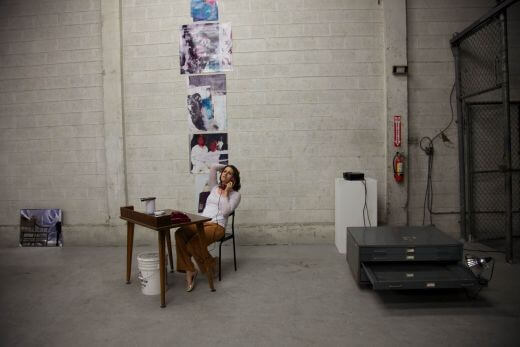
Jacquelyn Stucker in La Voix Humaine, BFI, February 2015. Set design by Rachel Libeskind
BFI
February 20, 2015
James Danner, founding director of New York–based Amanda + James, brought Francis Poulenc’s one-act opera for a soprano soloist, La Voix Humaine, to Miami over an unseasonably cool weekend in February. Before the show began, the audience, seated on the makeshift stage, or near to it, could hear downtown traffic and other nighttime noises just outside the large open doorway to BFI’s exhibition and performance space.
Jacquelyn Stucker, as Elle, began the show by waking up, quietly. She then made to leave, punching a button on the wall for the huge garage door, which—loudly—closes partway. All this is punctuated by the sudden sound of a phone ringing (piano by Matthew Odell), which brings Elle hurtling back onstage to answer it. The rest of the forty-minute opera consists of Elle’s side of the the final conversation she has with her lover, who has left her for another woman.
Stucker so beautifully plays the part of the jilted lover, imbuing her incredible voice with the anxieties born out of mistrust, regret, and, more often than not, technical difficulties with the telephone. Operators interrupt, party lines confuse, and Elle is under the constant threat of a disconnection—nearly every quiet, lyrical, tonal moment is eventually interrupted by a panicked “Allo?!”
In fact, the most dramatic moments, musically, don’t coincide with Elle’s confessions, which start small, but soon snowball. These are hushed, and the balance between them and the flailing panic of a potential missed call highlights the natural, conversational structure of the music. The phone, which tends to break down communication between the two lovers more often than it connects them, becomes Elle’s obsession and her nightmare—she sleeps with it, she calls it her “fearsome master,” a “terrible weapon.” Relatable, I’m sure, for many in the audience who sleep with their phones routinely, not because they’ve lost of the loves of their lives who might call back, but because what they fear, more than anything, is to be disconnected.










